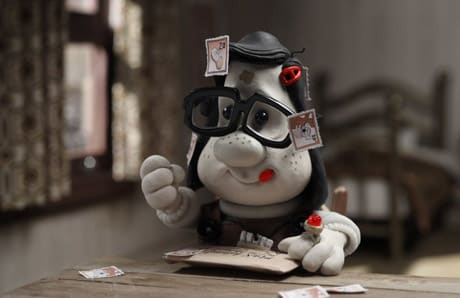Having premiered at Sundance earlier this year with limited, but mostly positive, word of mouth, only to play at a handful of other festivals and get a limited release in a couple of European countries, Mary and Max hasn't garnered the attention it rightfully deserves.
Australian director Adam Elliott, who won an Oscar back in 2003 for his short animated film Harvie Krumpet, has crafted a touching and often hilarious story of human idiosyncrasy, dysphoria and, ultimately, tenderness in unlikely places. Fans of bittersweet character dramedies such as Away We Go and Little Miss Sunshine will be pleased.
With sepia hues representing Melbourne, Australia and black & white for New York City, this feature-length claymation film tells the story of pen pals finding an unlikely bond. Mary Dinkle (voiced as a child by Bethany Whitmore and in adulthood by Toni Collette) is a sweet-natured eight-year-old social reject with an alcoholic mother and a poo-coloured birthmark on her forehead. Having only a stray chicken as a friend, she writes a letter to a random New York address hoping to find out where babies come from and find a new companion.
On the receiving end of this letter is Max Horovitz (Philip Seymour Hoffman), a socially alienated atheist Jew that suffers from severe anxiety issues and Asperger's syndrome. Initially thrown by this change in routine, the obese shut-in warms up to this newfound friend, sharing Tchotchkes and recipes for chocolate hotdogs, along with the wisdom that babies come from Rabbis, Catholic nuns or dirty whores.
Told mostly in voiceover through the letters they write each other, this is strictly a grown up affair, hinging on clever, sincere writing and playful animations. At its core, this is a film about the pain of being different in a world that values only familiarity and a bottom line.
It's wondrous in this capacity, indulging in the realities of character flaws and human frailty, ensuring that we care about Max and Mary's ability to find some sort peace amidst their misery.
(Mongrel Media)Australian director Adam Elliott, who won an Oscar back in 2003 for his short animated film Harvie Krumpet, has crafted a touching and often hilarious story of human idiosyncrasy, dysphoria and, ultimately, tenderness in unlikely places. Fans of bittersweet character dramedies such as Away We Go and Little Miss Sunshine will be pleased.
With sepia hues representing Melbourne, Australia and black & white for New York City, this feature-length claymation film tells the story of pen pals finding an unlikely bond. Mary Dinkle (voiced as a child by Bethany Whitmore and in adulthood by Toni Collette) is a sweet-natured eight-year-old social reject with an alcoholic mother and a poo-coloured birthmark on her forehead. Having only a stray chicken as a friend, she writes a letter to a random New York address hoping to find out where babies come from and find a new companion.
On the receiving end of this letter is Max Horovitz (Philip Seymour Hoffman), a socially alienated atheist Jew that suffers from severe anxiety issues and Asperger's syndrome. Initially thrown by this change in routine, the obese shut-in warms up to this newfound friend, sharing Tchotchkes and recipes for chocolate hotdogs, along with the wisdom that babies come from Rabbis, Catholic nuns or dirty whores.
Told mostly in voiceover through the letters they write each other, this is strictly a grown up affair, hinging on clever, sincere writing and playful animations. At its core, this is a film about the pain of being different in a world that values only familiarity and a bottom line.
It's wondrous in this capacity, indulging in the realities of character flaws and human frailty, ensuring that we care about Max and Mary's ability to find some sort peace amidst their misery.




